(完整版)初中英语句子分类练习
- 格式:doc
- 大小:26.83 KB
- 文档页数:6
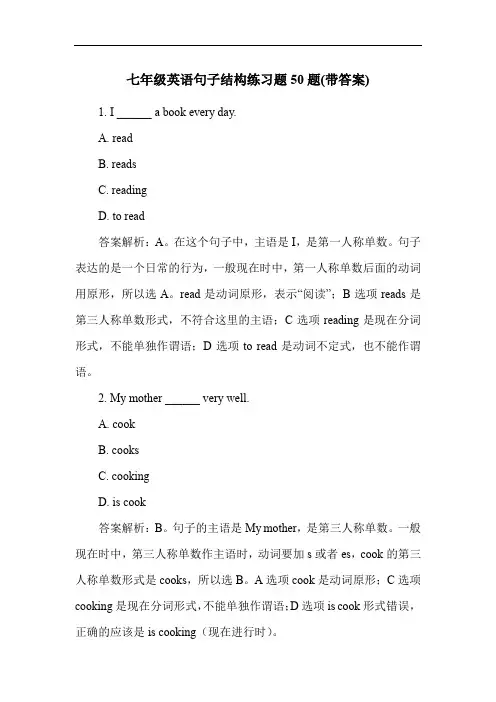
七年级英语句子结构练习题50题(带答案)1. I ______ a book every day.A. readB. readsC. readingD. to read答案解析:A。
在这个句子中,主语是I,是第一人称单数。
句子表达的是一个日常的行为,一般现在时中,第一人称单数后面的动词用原形,所以选A。
read是动词原形,表示“阅读”;B选项reads是第三人称单数形式,不符合这里的主语;C选项reading是现在分词形式,不能单独作谓语;D选项to read是动词不定式,也不能作谓语。
2. My mother ______ very well.A. cookB. cooksC. cookingD. is cook答案解析:B。
句子的主语是My mother,是第三人称单数。
一般现在时中,第三人称单数作主语时,动词要加s或者es,cook的第三人称单数形式是cooks,所以选B。
A选项cook是动词原形;C选项cooking是现在分词形式,不能单独作谓语;D选项is cook形式错误,正确的应该是is cooking(现在进行时)。
3. They ______ football after school.A. playB. playsC. playedD. playing答案解析:A。
主语They是第三人称复数,一般现在时中,第三人称复数后面的动词用原形,play是“玩”的意思,在这里表示“踢足球”,所以选A。
B选项plays是第三人称单数形式;C选项played是过去式,表示过去发生的动作,这里说的是放学后经常做的事情,不是过去的动作;D选项playing是现在分词形式,不能单独作谓语。
4. The boy ______ his homework at home.A. doB. doesC. didD. doing答案解析:B。
主语The boy是第三人称单数,一般现在时中,他做家庭作业这个动作,动词要用第三人称单数形式,do的第三人称单数是does,所以选B。
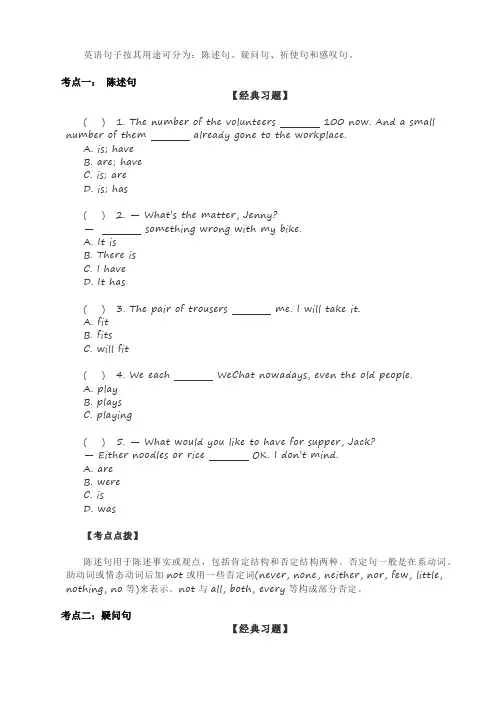
英语句子按其用途可分为:陈述句、疑问句、祈使句和感叹句。
考点一:陈述句【经典习题】( ) 1. The number of the volunteers 100 now. And a small number of them already gone to the workplace.A. is; haveB. are; haveC. is; areD. is; has( ) 2. —What’s the matter, Jenny?— something wrong with my bike.A. It isB. There isC. I haveD. It has( ) 3. The pair of trousers me. I will take it.A. fitB. fitsC. will fit( ) 4. We each WeChat nowadays, even the old people.A. playB. playsC. playing( ) 5. — What would you like to have for supper, Jack?— Either noodles or rice OK. I don’t mind.A. areB. wereC. isD. was【考点点拨】陈述句用于陈述事实或观点,包括肯定结构和否定结构两种。
否定句一般是在系动词、助动词或情态动词后加not或用一些否定词(never, none, neither, nor, few, little, nothing, no等)来表示。
not与all, both, every等构成部分否定。
考点二:疑问句【经典习题】( ) 1. — Is the girl in red your friend?—. She is learning Chinese now.A. Yes, it isB. Yes, he isC. Yes, she isD. Yes, she does( ) 2. — will the match between HAS and BIG be held?— In our school stadium.A. WhenB. WhereC. WhyD. How( ) 3. —do you volunteer in Old People’s Home?— Once a week. We hope to help the old more.A. How soonB. How manyC. How oftenD. How long( ) 4. — Bill, does your sister have brown hair or red hair?—. She takes after my mother.A. Yes, she doesB. No, she doesn’tC. Brown hairD. I don’t know( ) 5. He can hardly stay awake because he is so tired, ?A. is heB. isn’t heC. can’t heD. can he【考点点拨】疑问句用于提出问题,包括一般疑问句、特殊疑问句、选择疑问句和反意疑问句。
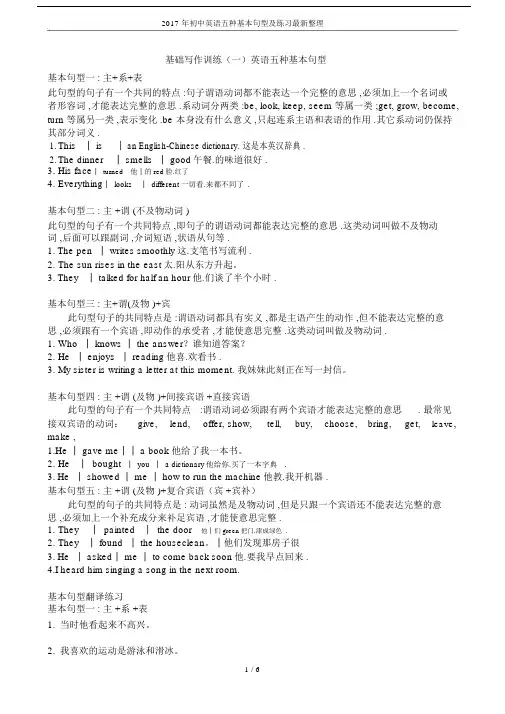
2017 年初中英语五种基本句型及练习最新整理基础写作训练(一)英语五种基本句型基本句型一 : 主+系+表此句型的句子有一个共同的特点 :句子谓语动词都不能表达一个完整的意思 ,必须加上一个名词或者形容词 ,才能表达完整的意思 .系动词分两类 :be, look, keep, seem 等属一类 ;get, grow, become, turn 等属另一类 ,表示变化 .be 本身没有什么意义 ,只起连系主语和表语的作用 .其它系动词仍保持其部分词义 .1.This │ is│ an English-Chinese dictionary. 这是本英汉辞典 .2.The dinner│ smells │ good午餐.的味道很好 .3.His face│ turned他│的red脸.红了4.Everything│ looks│ different一切看.来都不同了.基本句型二 : 主 +谓 (不及物动词 )此句型的句子有一个共同特点 ,即句子的谓语动词都能表达完整的意思 .这类动词叫做不及物动词 ,后面可以跟副词 ,介词短语 ,状语从句等 .1.The pen │ writes smoothly这.支笔书写流利 .2.The sun rises in the east太.阳从东方升起。
3.They │ talked for half an hour他.们谈了半个小时 .基本句型三 : 主+谓(及物 )+宾此句型句子的共同特点是 :谓语动词都具有实义 ,都是主语产生的动作 ,但不能表达完整的意思 ,必须跟有一个宾语 ,即动作的承受者 ,才能使意思完整 .这类动词叫做及物动词 .1.Who │ knows │ the answer?谁知道答案?2.He │ enjoys │ reading他喜.欢看书 .3.My sister is writing a letter at this moment. 我妹妹此刻正在写一封信。
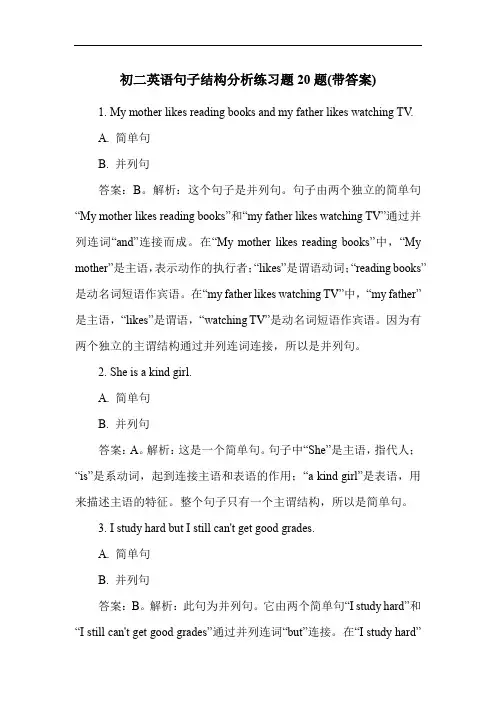
初二英语句子结构分析练习题20题(带答案)1. My mother likes reading books and my father likes watching TV.A. 简单句B. 并列句答案:B。
解析:这个句子是并列句。
句子由两个独立的简单句“My mother likes reading books”和“my father likes watching TV”通过并列连词“and”连接而成。
在“My mother likes reading books”中,“My mother”是主语,表示动作的执行者;“likes”是谓语动词;“reading books”是动名词短语作宾语。
在“my father likes watching TV”中,“my father”是主语,“likes”是谓语,“watching TV”是动名词短语作宾语。
因为有两个独立的主谓结构通过并列连词连接,所以是并列句。
2. She is a kind girl.A. 简单句B. 并列句答案:A。
解析:这是一个简单句。
句子中“She”是主语,指代人;“is”是系动词,起到连接主语和表语的作用;“a kind girl”是表语,用来描述主语的特征。
整个句子只有一个主谓结构,所以是简单句。
3. I study hard but I still can't get good grades.A. 简单句B. 并列句答案:B。
解析:此句为并列句。
它由两个简单句“I study hard”和“I still can't get good grades”通过并列连词“but”连接。
在“I study hard”中,“I”是主语,“study”是谓语,“hard”是副词作状语修饰“study”。
在“I still can't get good grades”中,“I”是主语,“can't get”是谓语,“good grades”是宾语。
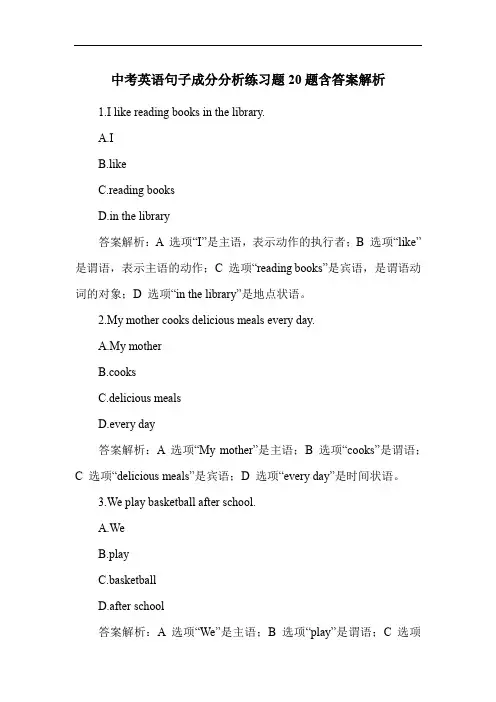
中考英语句子成分分析练习题20题含答案解析1.I like reading books in the library.A.IB.likeC.reading booksD.in the library答案解析:A 选项“I”是主语,表示动作的执行者;B 选项“like”是谓语,表示主语的动作;C 选项“reading books”是宾语,是谓语动词的对象;D 选项“in the library”是地点状语。
2.My mother cooks delicious meals every day.A.My motherB.cooksC.delicious mealsD.every day答案解析:A 选项“My mother”是主语;B 选项“cooks”是谓语;C 选项“delicious meals”是宾语;D 选项“every day”是时间状语。
3.We play basketball after school.A.WeB.playC.basketballD.after school答案解析:A 选项“We”是主语;B 选项“play”是谓语;C 选项“basketball”是宾语;D 选项“after school”是时间状语。
4.My father drives me to school.A.My fatherB.drivesC.meD.to school答案解析:A 选项“My father”是主语;B 选项“drives”是谓语;C 选项“me”是宾语;D 选项“to school”是地点状语。
5.I do my homework in my room.A.IB.doC.my homeworkD.in my room答案解析:A 选项“I”是主语;B 选项“do”是谓语;C 选项“my homework”是宾语;D 选项“in my room”是地点状语。
6.She sings a beautiful song.A.SheB.singsC.a beautiful songD.none of the above答案解析:A 选项“She”是主语;B 选项“sings”是谓语;C 选项“a beautiful song”是宾语。
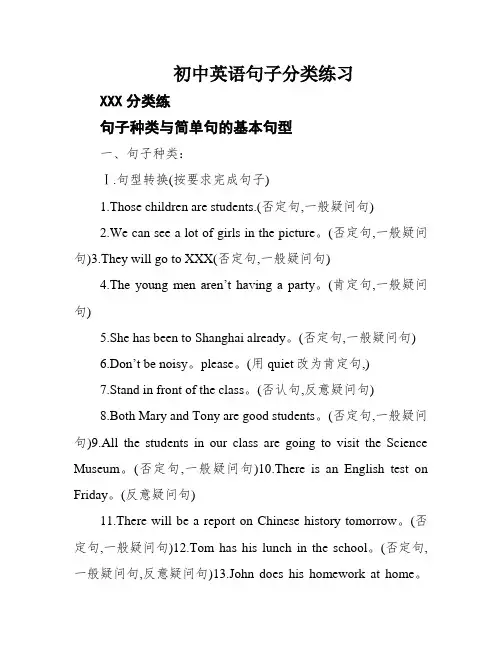
初中英语句子分类练习XXX分类练句子种类与简单句的基本句型一、句子种类:Ⅰ.句型转换(按要求完成句子)1.Those children are students.(否定句,一般疑问句)2.We can see a lot of girls in the picture。
(否定句,一般疑问句)3.They will go to XXX(否定句,一般疑问句)4.The young men aren’t having a party。
(肯定句,一般疑问句)5.She has been to Shanghai already。
(否定句,一般疑问句)6.Don’t be noisy。
please。
(用quiet改为肯定句,)7.Stand in front of the class。
(否认句,反意疑问句)8.Both Mary and Tony are good students。
(否定句,一般疑问句)9.All the students in our class are going to visit the Science Museum。
(否定句,一般疑问句)10.There is an English test on Friday。
(反意疑问句)11.There will be a report on Chinese history tomorrow。
(否定句,一般疑问句)12.Tom has his lunch in the school。
(否定句,一般疑问句,反意疑问句)13.John does his homework at home。
(否定句,一般疑问句,反意疑问句)14.He saw the TV news XXX。
(否定句,一般疑问句,反意疑问句)15.I think you are right。
(否定句,一般疑问句)16.This kind of car is made in Japan。
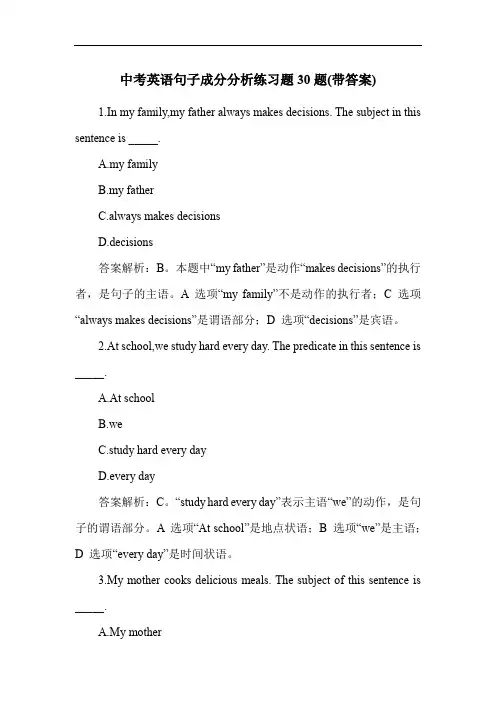
中考英语句子成分分析练习题30题(带答案)1.In my family,my father always makes decisions. The subject in this sentence is _____.A.my familyB.my fatherC.always makes decisionsD.decisions答案解析:B。
本题中“my father”是动作“makes decisions”的执行者,是句子的主语。
A 选项“my family”不是动作的执行者;C 选项“always makes decisions”是谓语部分;D 选项“decisions”是宾语。
2.At school,we study hard every day. The predicate in this sentence is _____.A.At schoolB.weC.study hard every dayD.every day答案解析:C。
“study hard every day”表示主语“we”的动作,是句子的谓语部分。
A 选项“At school”是地点状语;B 选项“we”是主语;D 选项“every day”是时间状语。
3.My mother cooks delicious meals. The subject of this sentence is _____.A.My motherB.cooksC.delicious mealsD.meals答案解析:A。
“My mother”是动作“cooks”的执行者,为主语。
B 选项“cooks”是谓语动词;C 和 D 选项“delicious meals”和“meals”是宾语。
4.My brother plays basketball after school. The predicate in this sentence is _____.A.My brotherB.plays basketball after schoolC.plays basketballD.after school答案解析:B。
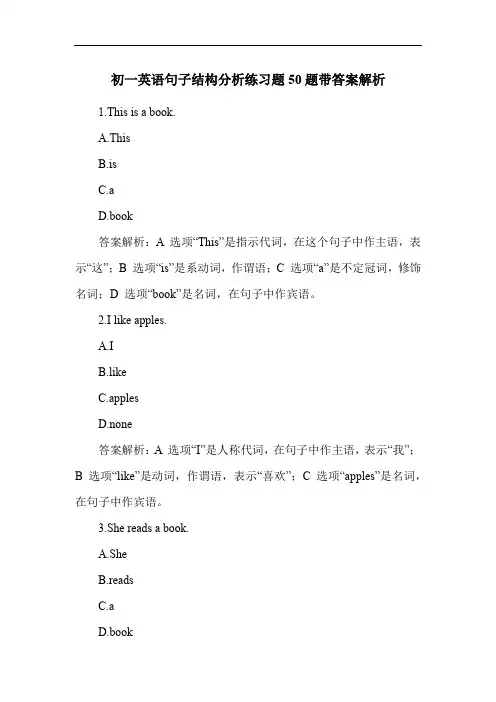
初一英语句子结构分析练习题50题带答案解析1.This is a book.A.ThisB.isC.aD.book答案解析:A 选项“This”是指示代词,在这个句子中作主语,表示“这”;B 选项“is”是系动词,作谓语;C 选项“a”是不定冠词,修饰名词;D 选项“book”是名词,在句子中作宾语。
2.I like apples.A.IB.likeC.applesD.none答案解析:A 选项“I”是人称代词,在句子中作主语,表示“我”;B 选项“like”是动词,作谓语,表示“喜欢”;C 选项“apples”是名词,在句子中作宾语。
3.She reads a book.A.SheB.readsC.aD.book答案解析:A 选项“She”是人称代词,在句子中作主语,表示“她”;B 选项“reads”是动词,作谓语,表示“读”;C 选项“a”是不定冠词,修饰名词;D 选项“book”是名词,在句子中作宾语。
4.He plays football.A.HeB.playsC.footballD.none答案解析:A 选项“He”是人称代词,在句子中作主语,表示“他”;B 选项“plays”是动词,作谓语,表示“玩”;C 选项“football”是名词,在句子中作宾语。
5.We study English.A.WeB.studyC.EnglishD.none答案解析:A 选项“We”是人称代词,在句子中作主语,表示“我们”;B 选项“study”是动词,作谓语,表示“学习”;C 选项“English”是名词,在句子中作宾语。
6.They sing songs.A.TheyB.singD.none答案解析:A 选项“They”是人称代词,在句子中作主语,表示“他们”;B 选项“sing”是动词,作谓语,表示“唱”;C 选项“songs”是名词,在句子中作宾语。
7.My mother cooks dinner.A.My motherB.cooksC.dinnerD.none答案解析:A 选项“My mother”是名词短语,在句子中作主语,表示“我的妈妈”;B 选项“cooks”是动词,作谓语,表示“做饭”;C 选项“dinner”是名词,在句子中作宾语。
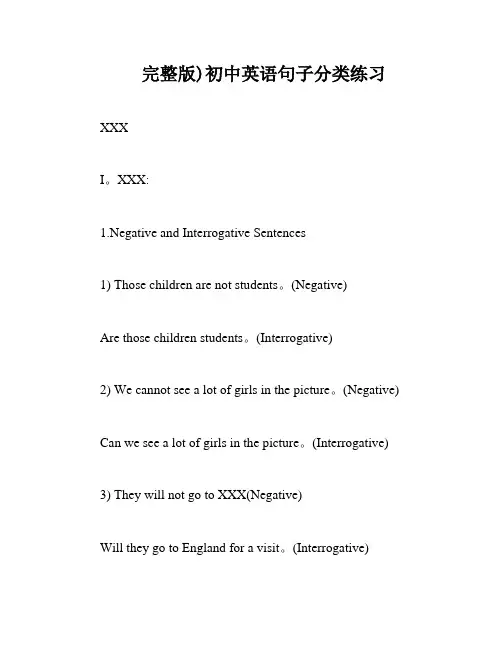
完整版)初中英语句子分类练习XXXI。
XXX:1.Negative and Interrogative Sentences1) Those children are not students。
(Negative)Are those children students。
(Interrogative)2) We cannot see a lot of girls in the picture。
(Negative) Can we see a lot of girls in the picture。
(Interrogative) 3) They will not go to XXX(Negative)Will they go to England for a visit。
(Interrogative)4) The young men are not having a party。
(Negative)Are the young men having a party。
(Interrogative)5) She has not been to Shanghai yet。
(Negative)Has she been to Shanghai already。
(Interrogative)6) XXX)7) Don't stand in front of the class。
(Negative)You won't stand in front of the class。
will you。
(Tag n)8) XXX Mary nor Tony is a good student。
(Negative)Are both Mary and Tony good students。
(Interrogative)9) Not all the students in our class are going to visit the Science Museum。
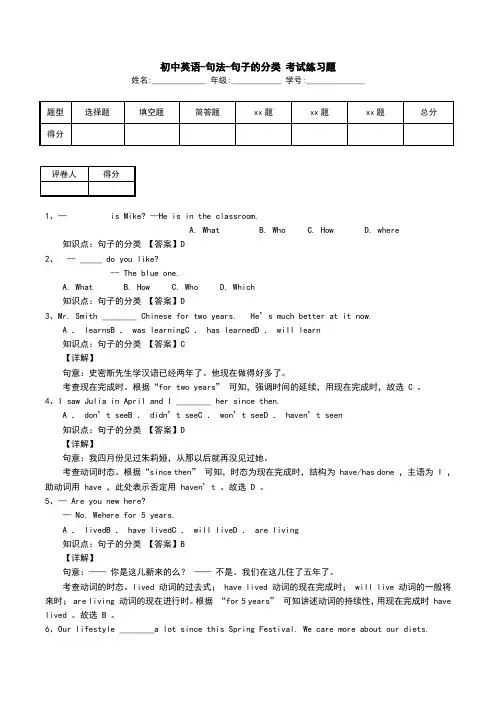
初中英语-句法-句子的分类 考试练习题姓名:_____________ 年级:____________ 学号:______________1、— is Mike? —He is in the classroom.A. WhatB. WhoC. HowD. where知识点:句子的分类 【答案】D2、 -- _____ do you like?-- The blue one.A. WhatB. HowC. WhoD. Which知识点:句子的分类 【答案】D3、Mr. Smith ________ Chinese for two years. He ’s much better at it now.A . learnsB . was learningC . has learnedD . will learn知识点:句子的分类 【答案】C【详解】句意:史密斯先生学汉语已经两年了。
他现在做得好多了。
考查现在完成时。
根据“for two years” 可知,强调时间的延续,用现在完成时,故选 C 。
4、I saw Julia in April and I ________ her since then.A . don ’t seeB . didn ’t seeC . won ’t seeD . haven ’t seen知识点:句子的分类 【答案】D【详解】句意:我四月份见过朱莉娅,从那以后就再没见过她。
考查动词时态。
根据“since then” 可知,时态为现在完成时,结构为 have/hasdone ,主语为 I ,助动词用 have ,此处表示否定用 haven ’t 。
故选 D 。
5、— Are you new here?— No. Wehere for 5 years.A . livedB . have livedC . will liveD . are living知识点:句子的分类 【答案】B【详解】句意:—— 你是这儿新来的么? —— 不是。
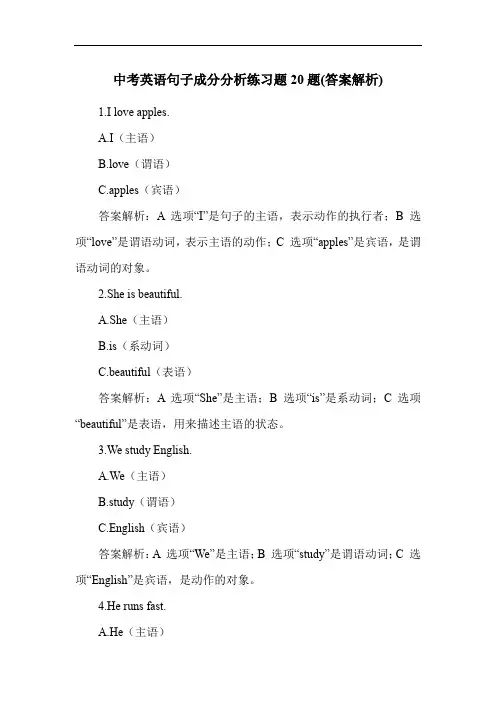
中考英语句子成分分析练习题20题(答案解析)1.I love apples.A.I(主语)B.love(谓语)C.apples(宾语)答案解析:A 选项“I”是句子的主语,表示动作的执行者;B 选项“love”是谓语动词,表示主语的动作;C 选项“apples”是宾语,是谓语动词的对象。
2.She is beautiful.A.She(主语)B.is(系动词)C.beautiful(表语)答案解析:A 选项“She”是主语;B 选项“is”是系动词;C 选项“beautiful”是表语,用来描述主语的状态。
3.We study English.A.We(主语)B.study(谓语)C.English(宾语)答案解析:A 选项“We”是主语;B 选项“study”是谓语动词;C 选项“English”是宾语,是动作的对象。
4.He runs fast.A.He(主语)B.runs(谓语)C.fast(状语)答案解析:A 选项“He”是主语;B 选项“runs”是谓语动词;C 选项“fast”是状语,修饰谓语动词。
5.They play basketball.A.They(主语)B.play(谓语)C.basketball(宾语)答案解析:A 选项“They”是主语;B 选项“play”是谓语动词;C 选项“basketball”是宾语。
6.I am a student.A.I(主语)B.am(系动词)C.a student(表语)答案解析:A 选项“I”是主语;B 选项“am”是系动词;C 选项“a student”是表语,描述主语的身份。
7.She sings well.A.She(主语)B.sings(谓语)C.well(状语)答案解析:A 选项“She”是主语;B 选项“sings”是谓语动词;C 选项“well”是状语,修饰谓语动词。
8.We read books.A.We(主语)B.read(谓语)C.books(宾语)答案解析:A 选项“We”是主语;B 选项“read”是谓语动词;C 选项“books”是宾语。
中考英语句子功能分类练习题40题(带答案)1. She is a beautiful girl.A. She is a handsome boy.B. He is a beautiful girl.C. She is an ugly girl.答案解析:原句是陈述句,表达她是一个漂亮的女孩。
A 选项说她是一个帅气的男孩,性别和描述都不对;B 选项人称错误;C 选项只是对原句中“beautiful”进行了否定,描述的人物正确,所以选C。
句子功能分类为陈述句,用于描述一个事实。
2. I like apples.A. I don't like apples.B. He likes apples.C. I like oranges.答案解析:原句为陈述句,表明我喜欢苹果。
A 选项对原句进行否定;B 选项人称错误;C 选项只是改变了喜欢的水果种类,所以选C。
句子功能分类为陈述句,表达个人喜好。
3. The book is on the table.A. The book is under the table.B. The pen is on the table.C. The book is in the bag.答案解析:原句是陈述句,说明书在桌子上。
A 选项位置不同;B 选项物品不同;C 选项位置不同,所以选B。
句子功能分类为陈述句,描述物品的位置。
4. My mother is a teacher.A. My father is a teacher.B. My mother is a doctor.C. My sister is a teacher.答案解析:原句为陈述句,说我的母亲是一名老师。
A 选项人物错误;B 选项职业不同;C 选项人物错误,所以选B。
句子功能分类为陈述句,介绍人物职业。
5. It is a sunny day.A. It is a rainy day.B. It is a cloudy day.C. It is a windy day.答案解析:原句是陈述句,表明是晴天。
句子成分及基本句型一、考点、热点回顾【句子的成分】在英文中句子成分包括:主语、谓语、宾语(直接宾语、间接宾语)、表语、定语和状语、宾语补足语等。
(一)主语:主语是谓语讲述的对象,表示所说的“是什么”或“是谁”。
一般由名词、代词、不定式或相当于名词的词或短语来充当。
它在句首。
如:(1)Lucy is a beautiful nurse. (名词作主语)(2)He reads newspapers every day. (代词作主语)(3)Smoking is harmful to the health. (动名词作主语)(4)To swim in Kunming Lake is a great pleasure.(不定式作主语)(5)What we should do is not yet decided. (主语从句作主语)(二)谓语说明主语“做什么”“是什么”或“怎么样”。
谓语(谓语部分里主要的词)必须是动词。
谓语和主语在人称和数两方面必须一致。
它在主语后面。
如:His parents are teachers. (系动词和表语一起作谓语)We study hard. (行为动词作谓语)We don’t finish reading the book. (助动词和行为动词一起作谓语)He can speak English. (情态动词和行为动词一起作谓语)(三)宾语宾语是动作、行为的对象,由名词、代词、不定式或相当于名词的词、短语来担任,它和及物动词一起说明主语做什么。
一般放在谓语之后。
She is doing her homework now.(名词作宾语)She says(that)she is ill.(宾语从句作动词宾语)We often help him.(代词作宾语)He likes to play basketball.(不定式作宾语)We enjoy listening to the music. 我们喜欢听音乐。
人教版中考英语句子功能分类练习题40题【含答案解析】1. I often go to school by bike. My brother often goes to school by bus. My sister often goes to school on foot. We all go to school in different ways.A. in the same wayB. in different waysC. in a wayD. by the way答案解析:B。
题干中明确提到“We all go to school in different ways.”,所以答案是B。
A 选项“in the same way”与题干意思相反;C 选项“in a way”是“在某种程度上”的意思,不符合题意;D 选项“by the way”是“顺便说一下”的意思,也不符合题意。
2. She is a good student. She studies hard every day.A. She is a bad student.B. She studies hard.C. She doesn't study hard.D. She is a lazy student.答案解析:B。
题干中明确说“She is a good student. She studies hard every day.”,所以答案是B。
A 选项与题干中“good student”矛盾;C 选项与题干中“studies hard”矛盾;D 选项“lazy student”与题干不符。
3. My father is a teacher. He teaches English.A. My father is a doctor.B. My father is a worker.C. My father is a teacher and he teaches Chinese.D. My father is a teacher and he teaches English.答案解析:D。
中考英语句子功能分类练习题50题(答案解析)1. I like apples.- I like bananas.- I don't like apples.- I like oranges.答案解析:第一个选项“I like bananas”和题干“ I like apples.”都是陈述句,表达个人喜好。
但题干说喜欢苹果,此选项说喜欢香蕉,与题干不符。
第二个选项“I don't like apples.”是否定句,与题干陈述句不符。
第三个选项“I like oranges.”和题干一样都是陈述句表达个人喜好,但题干说喜欢苹果,此选项说喜欢橘子,与题干不符。
2. She is a teacher.- She is a student.- She isn't a teacher.- She is a doctor.答案解析:第一个选项“She is a student.”和题干“She is a teacher.”职业不同,与题干不符。
第二个选项“She isn't a teacher.”是否定句,与题干陈述句不符。
第三个选项“She is a doctor.”和题干职业不同,与题干不符。
3. We go to school every day.- We go to park every day.- We don't go to school every day.- We go to zoo every day.答案解析:第一个选项“We go to park every day.”去的地方是公园不是学校,与题干不符。
第二个选项“We don't go to school every day.”是否定句,与题干陈述句不符。
第三个选项“We go to zoo every day.”去的地方是动物园不是学校,与题干不符。
4. He has a dog.- He has a cat.- He doesn't have a dog.- He has a rabbit.答案解析:第一个选项“He has a cat.”拥有的动物是猫不是狗,与题干不符。
11. We always work hard at English.主语状语谓语状语状语12. He said he didn't come.主句主语主句谓语从句主语从句谓语13. They love each other.主谓语宾语14. What did you buy?宾助动词主谓15. She watched her daughter playing the piano.主语谓语宾语宾语补足语16. Your job today is to help the old.主语定语系动词表语17. Speaking doesn't mean doing.主语谓语宾语18. Bye the time I got to the station, the train had left.时间状语从句主句主语主句谓语19. The children bought their parents a car for the 25th anniversary of their marriage.主语谓语间接宾语直接宾语状语20. It takes me an hour to get there.形式主语谓语宾语真正主语划分句子成分练习题(2)(一) 指出下例句中主语的中心词① The teacher with two of his students is walking into the classroom.② There is an old man coming here.③ The useful dictionary was given by my mother last year.④ To do today's homework without the teacher's help is very difficult.(二) 选出句中谓语的中心词① I don't like the picture on the wall.A. don'tB. likeC. pictureD. wall② The days get longer and longer when summer comes.A. getB. longerC. daysD. summer③ Do you usually go to school by bus?A. DoB. usuallyC. goD. bus④ There will be a meeting at the library this afternoon.A. will beB. meetingC. the libraryD. afternoon⑤ Did the twins have porridge for their breakfast?A. DidB. twinsC. haveD. breakfast⑥ Tom didn't do his homework yesterday.A. TomB. didn'tC. doD. his homework⑦ What I want to tell you is this.A. wantB. to tellC. youD. is⑧ We had better send for a doctor.A. WeB. hadC. sendD. doctor⑨ He is interested in music.A. isB. interestedC. inD. music⑩ Whom did you give my book to?A. giveB. didC. whomD. book(三) 挑出下列句中的宾语① My brother hasn't done his homework.A B C D② People all over the world speak English.A B C D③ You must pay good attention to your pronunciation.A B C D④ How many new words did you learn last class?A B C D⑤ Some of the students in the school want to go swimming, how about you?A B C D⑥ The old man sitting at the gate said he was ill.A B C D⑦ They made him monitor of the class.A B C D⑧ Go across the bridge and you will find the museum on the left.A B C D⑨ You will find it useful after you leave school.A B C D⑩ They didn't know who "Father Christmas" really is.A B C D(四) 挑出下列句中的表语① The old man was feeling very tired.A B C D② Why is he worried about Jim?A B C D③ The leaves have turned yellow.A B C D④ Soon They all became interested in the subject.A B C D⑤ She was the first to learn about it.A B C D(五) 挑出下例句中的定语① They use Mr. Mrs. with the family name.A B C D② What is your given name?A B C D③ On the third lap are Class 1 and Class 3.A B C D④ I am afraid some people forgot to sweep the floor.A B C D⑤ The man downstairs was trying to sleep.A B C D⑥ I am waiting for the sound of the other shoe!A B C D(六) 挑出下例句中的宾语补足语① She likes the children to read newspapers and books in the reading-room.A B C D② He asked her to take the boy out of school.A B C D③ She found it difficult to do the work.A B C D④ They call me Lily sometimes.A B C D⑤ I saw Mr. Wang get on the bus.A B C D⑥ Did you see Li Ming playing football on the playground just now?A B C D(七) 挑出下例句中的状语① There was a big smile on her face.A B C D② Every night he heard the noise upstairs.A B C D③ He began to learn English when he was eleven.A B C D④ The man on the motorbike was travelling to fast.A B C D⑤ With the medicine box under her arm, Miss Li hurried off.A B C D⑥ She loves the library because she loves books.A B C D⑦ I am afraid that if you've lost it, you must pay for it.A B C D⑧ The students followed Uncle Wang to see the other machine.A B C D(八) 划出句中的直接宾语和间接宾语① Please tell us a story.② My father bought a new bike for me last week.③ Mr. Li is going to teach us history next term.④ Here is a pen. Give it to Tom.⑤ Did he leave any message for me?划分句子成分练习题(2)参考答案(一) ① teacher ② man ③ dictionary ④ To do(二) ① B ② A ③ C ④ A ⑤ C ⑥ C ⑦ D ⑧ C ⑨ A ⑩ A(三) ① D ② D ③ B ④ A ⑤ B ⑥ D ⑦ C ⑧ D ⑨ A ⑩ D(四) ①D ②B ③D ④C ⑤B(五) ① C ② C ③ A ④ B ⑤ B ⑥ D(六) ① C ② C ③ C ④ C ⑤ D ⑥ B(七) ① D ② A ③ D ④ D ⑤ A ⑥ D ⑦ C ⑧ D(八) ① us, 间接宾语a story, 直接宾语② me, 间接宾语a new bike, 直接宾语③ us, 间接宾语history, 直接宾语④ Tom, 间接宾语it, 直接宾语⑤ me, 间接宾语message, 直接宾语。
初中英语句子成分的划分及练习种谓语动词叫做系动词,常见的有be动词(am。
is。
are。
was。
were等)和感官动词(look。
sound。
feel等)。
S│V│P(系动词)1.She│is beautiful.她很漂亮。
2.He│looks XXX.他看起来很疲倦。
3.XXX flowers│XXX.花儿散发着甜香。
4.XXX XXX.蛋糕味道很好。
5.The room│feels cold.房间感觉很冷。
6.The book│seems interesting.这本书似乎很有趣。
7.The music│sounds soothing.音乐听起来很舒缓。
8.The sky│remains blue.天空依旧是蓝色的。
基本句型三:SVO(主+谓+宾)此句型的句子除了主语和谓语,还有一个宾语。
宾语可以是名词、代词、动词不定式等,一般在谓语动词后面。
及物动词(vt.)需要宾语来补充完整的意思。
S│V│O(及物动词)1.I│love you.我爱你。
2.XXX.她买了一件新裙子。
3.They│planted some XXX.他们种了一些树。
4.XXX.他写了一封信。
5.W e│ate pizza for XXX.我们晚餐吃了披萨。
6.She│gave me a book.她给了我一本书。
7.They│built a house last year.他们去年建了一座房子。
8.XXX│taught us English.老师教我们英语。
基本句型四:SVoO(主+谓+间宾+直宾)此句型的句子除了主语、谓语和直接宾语,还有一个间接宾语。
间接宾语一般是人,直接宾语可以是物品、人或抽象概念,一般在间接宾语前面。
有些及物动词需要同时有直接宾语和间接宾语才能表达完整的意思。
S│V│O│O(及物动词+间接宾语+直接宾语)1.She│bought me a gift.她给我买了一份礼物。
2.They│sent him a postcard.他们给他寄了一张明信片。
初中英语分类练习——句子种类与简单句的基本句型一、句子种类:Ⅰ. 句型转换(按要求完成句子)1. Those children are students.(否定句, 一般疑问句)2. We can see a lot of girls in the picture. (否定句, 一般疑问句)3. They will go to England for a visit. (否定句, 一般疑问句)4. The young men aren’t having a party. (肯定句, 一般疑问句)5. She has been to Shanghai already. (否定句, 一般疑问句)6. Don’t be noisy, please. (用quiet改为肯定句,)7. Stand in front of the class. (否定句, 反意疑问句)8. Both Mary and Tony are good students. (否定句, 一般疑问句)9. All the students in our class are going to visit the Science Museum. (否定句, 一般疑问句)10. There is an English test on Friday. (反意疑问句)11. There will be a report on Chinese history tomorrow. (否定句, 一般疑问句)12. Tom has his lunch in the school. (否定句, 一般疑问句, 反意疑问句)13. John does his homework at home. (否定句, 一般疑问句, 反意疑问句)14. He saw the TV news yesterday evening. (否定句, 一般疑问句, 反意疑问句)15. I think you are right. (否定句, 一般疑问句)16. This kind of car is made in Japan. (否定句, 一般疑问句)17. Arthur runs fastest in his class.(就划线部分提问)________ runs fastest in his class?18. Bob”s painting was put up on the wall of our school.(同上)________ painting was put up on the wall of our school?19. Chapter One is very difficult to learn. (同上)________ chapter is very difficult to learn?20. Mary does her homework after supper in the evening. (同上)________ ______ Mary ______ after supper in the evening?21. He has borrowed four books from the school library. (同上)_______ _______ he borrowed from the school library?22. It took him 30 minutes to get there. (同上)______ ______ ______ it take him to get there?23. My father is a teacher in the school. (同上)_______ ________ your father ______ in the school?24. It will be Wednesday the day after tomorrow. (同上)________ ______ will it be the day after tomorrow?25. There are Three thousand people in the factory. (同上)_______ _______ people _______ _______ in the factory?26. Linda’s mother works in a big hotel. (同上)_______ _______ Linda’s mother work?27. They usually go to school by bus. (同上)_______ _______ they usually go to school?28. They couldn’t pass the exam because they didn’t work hard. (同上)_______ _______ they pass the exam?29. He said something important at the meeting.(改为否定句,一般疑问句)He _____ ______ ______ important at the meeting.______ he ______ ______ important at the meeting?30. I have to wash all the plates and things after meals.(划线提问)_____ _____ you have to wash all the plates and things?31. The woman in the red coat is her mother.(划线提问)______ ______ is her mother?32. Li Ping spent twenty yuan on the dictionary.(划线提问)_____ ____ ____ Li Ping _____ on the dictionary?33. Both of his parents are workers.(改成否定句)___ of his parents ______ a worker.34. He went to the park with his sister.(划线提问)_____ ____ ____ he go to the park?35. We really enjoyed working on the farm.(划线提问)What _____ you really enjoy ______?36. She writes to her parents once a week.(划线提问)_______ ______ ______ she write to her parents?37. Our P.E teacher has been at this school since he came.(划线提问)______ ______ ______ our P.E teacher been at this school38. It’s ten minutes’ walk from my home to the school.(对划线部分提问)_____________is it from your home to the school?39. She is going to be a nurse in the future.( 对划线部分提问)__________is she going to ______in the future?40. A llan will go back to England by plane next month. .( 对划线部分提问) ______ _______ Allan go back to England next month.41. John went to see his grandmother once a week. .( 对划线部分提问)___________________________ John go to see his grandmother?42. I have been to Beijing twice. .( 对划线部分提问)___________ _____________ ___________ have you been to Beijing. 43. The old man can hardly dress himself.(改为反意疑问句)The old man can hardly dress himself,___________________?44.Jim is ill. Let’s go and see him after school. (改为反意疑问句)Jim is ill. Let’s go and see him after school,_______________________?45.I don’t think his father knows English. (改为反意疑问句)His father hardly knows English,__________________?46. He thinks his aunt is right. (改为反意疑问句)He thinks his aunt is right,___________ ___________?47. Linda’s just come back from America . (改为反意疑问句)Linda’s just come back from America, ______________________?48.It is cold today. (改写成感叹句)How __________ it is today!49. She sings very well. (改写成感叹句)__________ well she sings!50. He speaks English fluently! (改写成感叹句)__________ __________ he speaks English!Ⅱ.单项选择( )1、Few of them hurt themselves in the accident last night,________A. don’t theyB. didn’t theyC. did theyD.do they( )2、 -You’ve never seen dinosaur eggs, have you ?--_____. How I wish to visit the Dinosaur World.A. Yes, I haveB. No, I haven’tC. Certainly, I haveD. Of course, I haven’t ( )3、His sister had a bad cough, ______she?A. wasn’tB. doesn’tC.hadn’tD.didn’t( )4、Mr. Green went to Shenzhen on business last week,________?A. isn’t heB.doesn’t heC.didn’t heD.hasn’t he( )5、John can hardly understand any Chinese, _________he?A. Can’tB. doesn’tC.canD. does( )6、Don’t smoke in the meeting-room,_________?A. do youB.will youC.can youD.could you( )7、Lucy, you clean the blackboard today,_______A. do youB.did youC. will youD. can you( )8、Miss Cheng will never forget her first visit to Canada ,________?A. will sheB.won’t sheC.isn’t she d. wasn’t she( )9、The lady couldn’t say a word when she saw the snake,________?A. could the ladyB.couldn’t the ladyC. could sheD.couldn’t she ( )10、----________sweater is this?----I think it’s Peter’s.A. WhoB.WhatC.WhichD.Whose( )11、---______I go and meet you at the airport?---No ,thanks, dear . I can take a taxi home.A. WillB.DoC.ShallD.Should( )12、------_____is the Confucian Temple(孔庙) from here?------It’s about 10 minutes’ walk.A. How manyB.How longC.How muchD. How far( )13、-----______may I keep these book?-----two weeks.A. How oftenB. How farC.How longD.How soon( )14、Tina is unhappy now,________?A. isn’t sheB. is sheC. is heD. did she( )15、---_____you _____TV at the moment?----No ,you can turn it off.A. Did, watchB.Are ,watchingC. Do ,watchD.Have , watched( )16、----_____do you go to Hong Kong?----sorry , I’ve never been there.A. How longB. How oftenC.How farD. How soon( )17、A: ______you ever _____ the Great Wall?B: Only once.A. Did ,goB.Have , been toC.Have ,gone toD.Have ,been in ( )18、----You lent me some money a few months ago.-----_____? I don’t remember lending you any money .A. Did IB.Did youC.Do ID.Do you( )19、----______is it from here to Yancheng Railway Station?----About two kilometers.A. How oftenB.How farC.How soonD.How long( )20、----Are you going to borrow a dictionary or a magazine?----______.A. Yes, a dictionaryB. No, a magazineC. A dictionaryD.Yes both ( )21、My uncle has never been to a foreign country,_______?A. has heB.does heC. hasn’t heD.doesn’t he( )22、There is some water in that bottle, isn’t _______A. thereB.itC. thatD. those( )23、----_______will the foreign students be back from Nanjing.----In two days, I think .A. How soonB.How oftenC.How farD. How fast( )24、----Have you seen the film Return Of the King ?-----_______. I going to see it tonight.A. No , I didn’tB. Yes ,I doC. Yes ,I haveD.Not yet( )25、----John, will you please paint the door yellow?----__________?A. WhyB. What is itC. How is itD.How about( )26、---Let’s go and play football,__________?---That’s wonderful.A. will youB. do youC. won’t youD.shall we( )27、---The boy has to stay at home to look after his little sister,_______?---Yes, because his mother has gone shopping.A. does heB. is heC. doesn’t heD.hasn’t he( )28、---You won’t follow his example, will you ?---________________,I don’t think he is right.A. No, I won’tB. Yes, I willC. No, I willD.Yes, I won’t( )29、----____________?---The one behind the tree.A. Whose girlB. Who’s that girlC. Which girlD.Where’s the girl ( )30、______the population of china?A. How manyB. How muchC. How’sD.What’sⅢ. 汉译英(A)感叹句1. 多棒的书啊!2. 多么有趣的故事呀!3. 多么漂亮的花呀!4. 多么大的雪呀!5. 多么诚实的孩子呀!6. 时间过得真快呀!7. 好凉快呀!8. 精彩极了!9. 多么高的楼房呀!10. 多么糟糕的天气呀!11. 多么明亮的阳光呀!(B)主语+谓语(S+V)1.他们将接受建议。